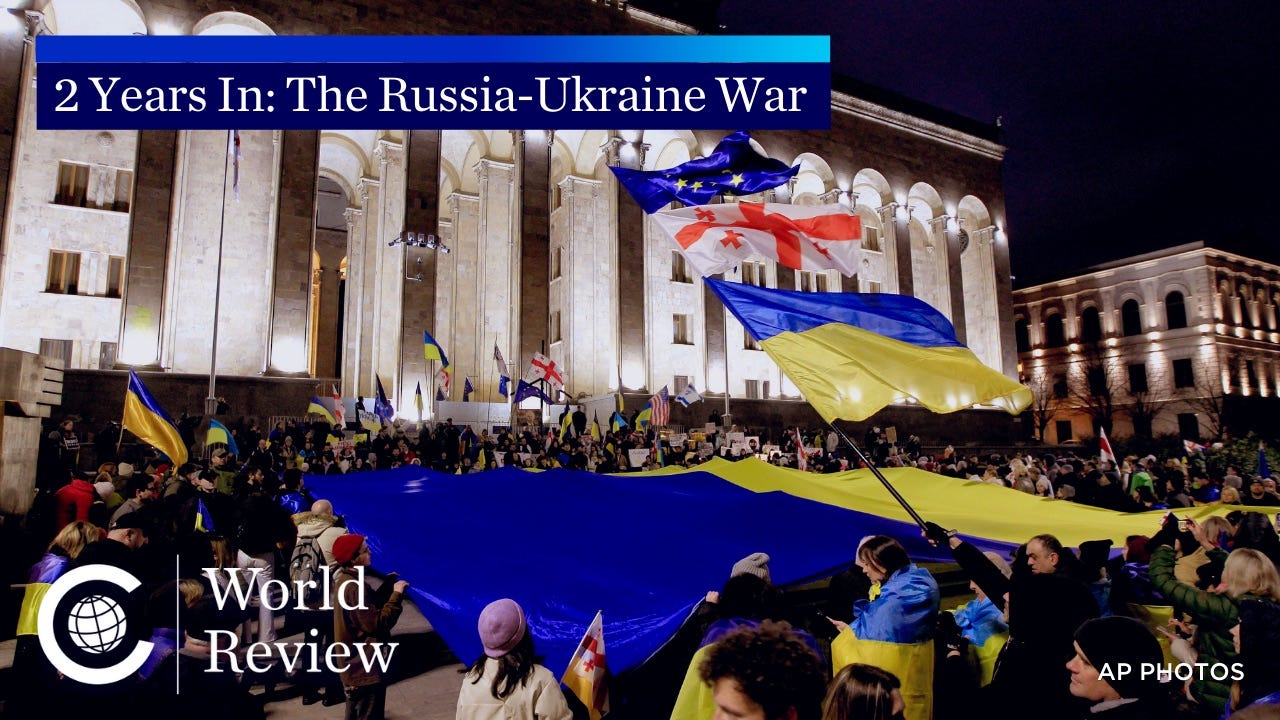World Review: Two Years In — The Russia-Ukraine War
A brief synopsis of this week's show
Each Friday morning, I host a video podcast called “World Review with Ivo Daalder” where three journalists from major news outlets around the world join me in discussing the latest global news stories of the week.
This morning, March 1, I was joined by Catherine Philp of The Times of London, Anton La Guardia of The Economist, and Yarolsav Tofimenko of the Wall Street Journal.
While I encourage you to watch or listen to the episode (and subscribe wherever you get your podcasts!), here are three interesting things I took away from our discussion today:
Two years into Russia’s war on Ukraine, the frontlines remain relatively stable, as they have for more than a year. But there is a lot of bloody fighting and Russia is clearly on the offense. The main reason, Yaroslav explained, is the shortage of munitions—especially artillery shells—in the Ukrainian inventory compared to what Russia has been able to field and get from North Korea. In some areas, Russia has a 10-1 advantage in available shells, allowing their troops to overwhelm the outmanned and outgunned defenders. That is how Russia was able to take its second town since Ukraine’s successful counteroffensive of late 2022. But it did so at great cost: losing some 16,000 soldiers and 400 tanks and armored vehicles. The key to longterm victory for Ukraine is to be able to get through this year—which requires US funding to provide the only available supply of munitions and missiles Ukraine needs to defend itself. Thereafter, the balance should shift in Ukraine’s favor—provided Europeans continue to boost production and supply Kyiv with the forces they needed—as Russia runs out of tanks and armored vehicles for which there is no ready source of resupply.
Meanwhile, Europeans are debating how much more they can do to help Ukraine given that the United States has become a laggard. French President Macron’s announcement earlier this week that he would not rule out sending troops exposed internal divisions on how far each country is willing to go. But, Catherine argued, that shouldn’t distract from the reality that Europeans generally are increasingly aware that Russia poses not just an existential threat to Ukraine but also to them directly. If anything, resolve to help Ukraine and defeat Russia has strengthened over time (in contrast to the United States, where resolve is waning). That also explains why few people these days are talking about a negotiations or a final settlement. The threat to Ukraine and to Europe won’t end with an agreement that no one believes Putin would abide by. Only Russia’s ultimate defeat would end the threat. Until then, supporting Ukraine and bolstering deterrence are the name of the game.
The United States is an increasing outlier when it comes to supporting Ukraine and demonstrating resolve. The reason is growing divisions among Americans, and especially among Republicans, Anton maintained. One group believes that what is at stake in Ukraine is fundamental to US security. China is watching, and so are North Korea and Iran. If Russia succeeds and the US falters, Beijing might take greater risks against Taiwan and elsewhere, North Korea against the South, and Iran against the Middle East. It’s therefore vital that Russia not succeed. A second group believes the US can no longer be the global policeman and needs to focus on the growing threat in Asia and let Europe take care of Russia and the Middle East of itself. A third, growing Republican constituency believes problems at home and the border with Mexico are of far greater concern than Ukraine’s border with Washington. This debate will continue throughout the presidential elections. The world will be watching.
That’s it for my quick takes of this week’s episode here on America Abroad. To get the full flavor, please listen to the episode itself.



